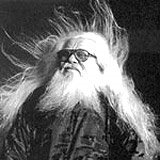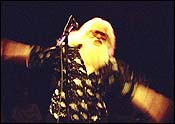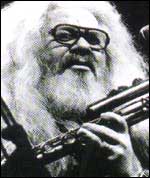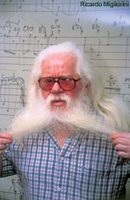
Clique aqui para baixar a primeira parte /Download the first part
Clique aqui para baixar a segunda parte /Download the second part
+ 5 faixas bônus ao vivo / + 5 live unreleased bonus tracks
........................................................
 Hermeto Pascoal nasceu em Lagoa da Canoa, município de Arapiraca, Alagoas, no dia 22 de junho de 1936. Ele foi um prodígio musical: ele começou com a flauta e aos oito anos já tocava sanfona. Com onze anos ele estava tocando nos bailes e forrós em torno da região de Arapiraca.
Hermeto Pascoal nasceu em Lagoa da Canoa, município de Arapiraca, Alagoas, no dia 22 de junho de 1936. Ele foi um prodígio musical: ele começou com a flauta e aos oito anos já tocava sanfona. Com onze anos ele estava tocando nos bailes e forrós em torno da região de Arapiraca. Quando estava com quatorze, sua família se mudou para Recife e Hermeto começou a ganhar dinheiro em programas de rádio. No final dos anos 50 ele se mudou para São Paulo. Sua voracidade musical era enorme e aos poucos ele aprendia a tocar de tudo que viesse em seu caminho: piano, baixo, palhetas, percussão; enfim, tudo.
Como qualquer músico da sua época, ele integrou grupos de bossa nova no começo dos anos 60, tocando com artistas que hoje têm carreiras respeitáveis, como são as dos artistas Airto Moreira, Heraldo do Monte e Sivuca (com quem tinha um trio de acordeons chamado "O Mundo Pegando Fogo").
Em 1964, ele fundou o "Sambrasa Trio", com Airto Moreira e o baixista Humberto Clayber. Mais tarde, Airto estava num grupo chamado "Trio Novo" com os guitarristas Heraldo do Monte e Theo de Barros. Hermeto se reuniu ao grupo que passou a se chamar "Quarteto Novo".
O Quarteto se dedicava a uma reinvenção progressiva das canções nordestinas. "Nós tocávamos baião, xaxado, mas os arranjos eram muito jazzy, em tempo 4/4 com modernas harmonias".
Infelizmente, o grupo só gravou um disco e foi em 1967: "Quarteto Novo". Esse grupo exerceu uma profunda influência na música instrumental brasileira na década de 60 e os efeitos até hoje podem ser sentidos. Em 1970, Airto convidou Hermeto para gravar um disco nos Estados Unidos.
Antonio Carlos Jobim, Duke Pearson e Flora Purim também tinham interesse em sua permanência por lá. Ele também gravou com Miles Davis e contribuiu com duas canções para seu álbum de 1970, "Live Evil": Igrejinha (Little Church) and "Nem Um Talvez" (Not even a maybe).
 Enquanto esteve nos Estados Unidos, o multi-instrumentista pode apresentar suas extraordinárias habilidades como improvisador em concertos, e suas composições originais e idiossincráticas. Teve sua obra gravada por vários artistas, entre eles, Gil Evans e a Sinfônica de Berlin.
Enquanto esteve nos Estados Unidos, o multi-instrumentista pode apresentar suas extraordinárias habilidades como improvisador em concertos, e suas composições originais e idiossincráticas. Teve sua obra gravada por vários artistas, entre eles, Gil Evans e a Sinfônica de Berlin. As canções que Hermeto compõe são choro, frevo, maxixe, baião, jazz e de outras naturezas, misturando tudo livremente, em combinações pouco usuais: uma só canção pode possuir vários ritmos.
Hermeto retornou ao Brasil em 1973, onde gravou "A Música Livre De Hermeto Pascoal", e depois voltou aos EUA onde gravou em 1976, "Slaves Mass".
Este disco, além dos instrumentos exóticos que sempre o acompanham, ele teve a presença e o companheirismo dos talentos de Airto, Flora Purim, Laudir de Oliveira, Raul de Souza, David Amaro, Ron Carter e Alphonso Johnson.
Seus discos gravados no Brasil, apresentaram novos músicos como Pernambuco (percussão), Jovino Santos Neto (teclados e flautas), Marcio Bahia (bateria), Carlos Malta (flautas, saxofones) e Itiberê Zwarg (baixo). De 1983 até 1989, Hermeto gravou para um pequeno selo brasileiro dedicado à música instrumental, o Som Da Gente.
************************
Composer. Instrumentalist. He played the accordion, flute, bottle, piano, kettle, saxophone and synthesizer among other instruments. Self taught, he learned to play practically on his own.
He began playing the accordion at 10 years old. He learned with his brother José Neto. Them both began to take it in turns to play the accordion at parties. He moved to Recife in 1950.
 At 14 years old he made his debut with his brother José Neto on the Tamandaré radio station in Recife. In 1956 he returned to Radio Jornal do Comércio where he had been before for a short time. He got to be regional director. In 1958 he went to Paraíba where he joined Radio Tabajara in João Pessoa city and he began to perform in Maestro Gomes orchestra. He made himself distinctive as an instrumentalist playing in the orchestra despite not being able to read music. Also in 1958 he went to Radio Mauá in Rio de Janeiro, he was an accordion player in the Regional de Pernambuco do Pandeiro. He also was in the Fafá Lemos and Copinha groups. He began to dedicate himself to studying the piano and he played in the evening.
At 14 years old he made his debut with his brother José Neto on the Tamandaré radio station in Recife. In 1956 he returned to Radio Jornal do Comércio where he had been before for a short time. He got to be regional director. In 1958 he went to Paraíba where he joined Radio Tabajara in João Pessoa city and he began to perform in Maestro Gomes orchestra. He made himself distinctive as an instrumentalist playing in the orchestra despite not being able to read music. Also in 1958 he went to Radio Mauá in Rio de Janeiro, he was an accordion player in the Regional de Pernambuco do Pandeiro. He also was in the Fafá Lemos and Copinha groups. He began to dedicate himself to studying the piano and he played in the evening. He moved to São Paulo in 1961. In 1962 as a multi- instrumentalist he joined Som Quatro. In 1964 he formed with double bass player Claiber and with drummer Airto Moreira the Sambrasa Trio besides working as a piano player in the evenings and he began to play the flute. In 1965 he was the flute player in the recording of the record Caminho.
In 1966 he joined the Quarteto Novo and he began accompanying Geraldo Vandré in his shows. In 1967 he had his first composition recorded O ovo in the album Quarteto Novo the group’s first and only record. Also in 1967 the Quarteto Novo accompanied Marília Medalha and Edu Lobo in the interpretation of Ponteio a composition by Edu Lobo and Capinam the winner of the 3rd MPB Festival on TV Record. In 1968 he performed in France. In 1969 the Quarteto Novo broke up and Hermeto started to accompany Edu Lobo on his performances.
He recorded with Miles Davis on the album Miles Davis live on which there were two of Hermeto’s compositions Igrejinha and Nenhum talvez. In 1971 the composition Gaio da roseira authored by Hermeto’s parents was released on a new album by Airto Moreira. He recorded his first record in 1971 in the United States. The distinctive point of the record was the composition Velório an erudite suite about an erudite theme.
 In 1972 he received the best solo player award. In 1973 he recorded his first record in Brazil A música livre de Hermeto Pascoal where he again surprised everybody with his innovations. On the track Serei rei the recording crew needed to go to a farm and Hermeto played in the middle of hogs, hens, geese and turkeys. In 1973 he received the best arranger award. In 1975 he performed at TV Globo’s Abertura Festival where he interpreted the composition Porco na festa which he received the best arrangement award. In 1977 he recorded his third record Missa dos escravos in the United States.
In 1972 he received the best solo player award. In 1973 he recorded his first record in Brazil A música livre de Hermeto Pascoal where he again surprised everybody with his innovations. On the track Serei rei the recording crew needed to go to a farm and Hermeto played in the middle of hogs, hens, geese and turkeys. In 1973 he received the best arranger award. In 1975 he performed at TV Globo’s Abertura Festival where he interpreted the composition Porco na festa which he received the best arrangement award. In 1977 he recorded his third record Missa dos escravos in the United States. In 1978 he performed at the Jazz Festival in São Paulo and surprised everybody by playing a bacia. His first record recorded in the United States was released in Brazil. He recorded his second Brazilian record in 1979. Although he was seen by many as not being very commercial, Hermeto has received several awards as one of the best contemporary instrumentalists and arrangers. Also in 1979 he performed at the Montreux Jazz Festival in Switzerland and following that he released the double album Hermeto Pascoal ao vivo recorded during his performance at the festival.
In the 1980s he released five successful albums. In 1996 he finished a project to compose a song every single day of the year. The work was released in the form of a songbook and he received the Sharp award for best instrumental arrangement for the arrangements for the album Kids of Brazil by Duofel. Also in 1996 he received the Ary Barroso award. He made trips to the United States and Europe constantly. I
n 2000 he published the score book Calendário do som with a song for every day of the year, was launched in São Paulo with Hermeto and the Popular chamber orchestra playing the first and the last of the 366 themes. Also in 2000 he went on a tour in Europe and Lebanon. In 2001 in Rio de Janeiro he did a show to launch the second edition of his Calendário do som and he did a show with Sivuca as part of the series Sanfona brasileira. Also in 2001 he released the album Eu e Eles with a show on the Arpoador beach in Rio de Janeiro. In 2002 he performed solo in a show in Rio de Janeiro called the multi-instrumental opera.
---------------------------
This brilliant, unconventional and uncompromising music draws on jazz, choro, Northeast rhythms and Hermeto's outrageous penchant for inventing new instruments and combining existing instruments in fascinating new ways. Don't expect the easy sway of bossa nova. This is music that challenges and inspires.

 Br-Instrumental no Twitter
Br-Instrumental no Twitter





4 comentários:
Thank you friend, from Turkey. great works, great musicians, great blog.
Olá Amigo,
O link do álbum nao funciona.
Ótimo blog,
Abrazzz
Fernando
Desculpem a intromissão, mas gostaria de sugerir uma pesquisa mais atenta, com relação ao nome da banda que o Hermeto tinha com o sivuca, que se não me falha a memória não era mundo em chamas não; o nome era "SERTÃO PEGANDO FOGO", pelo fato de que os componentes do trio eram albinos.
Cara, valeu pelo toque. Não é intromissão de forma alguma.
Na verdade o grupo se chamava "O Mundo Pegando Fogo". Já corrigi no texto. Como eu informo na postagem, esse texto foi pego do site Clube de Jazz. Mas fui lá no site oficial do Hermeto e confirmei o nome do grupo.
Postar um comentário